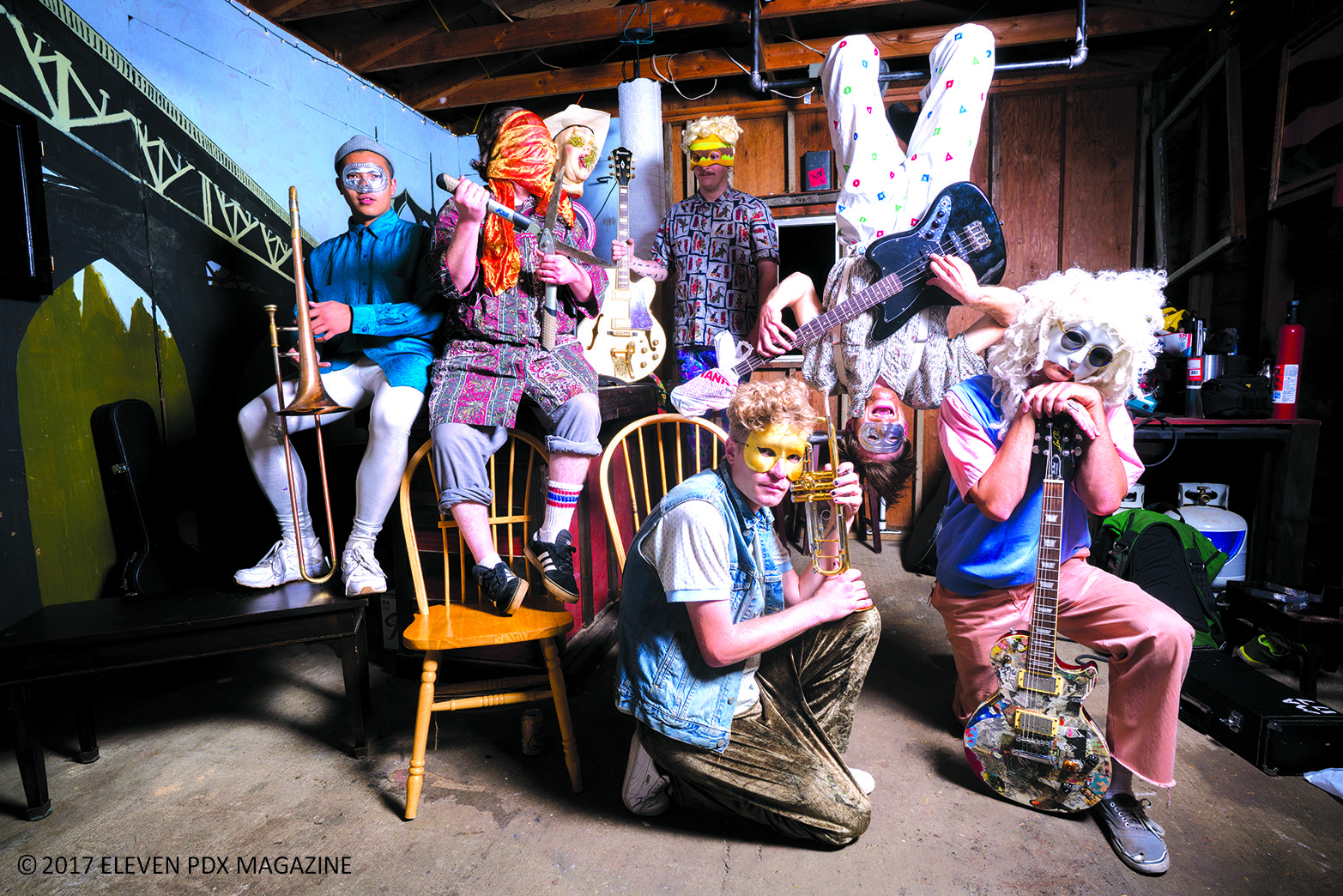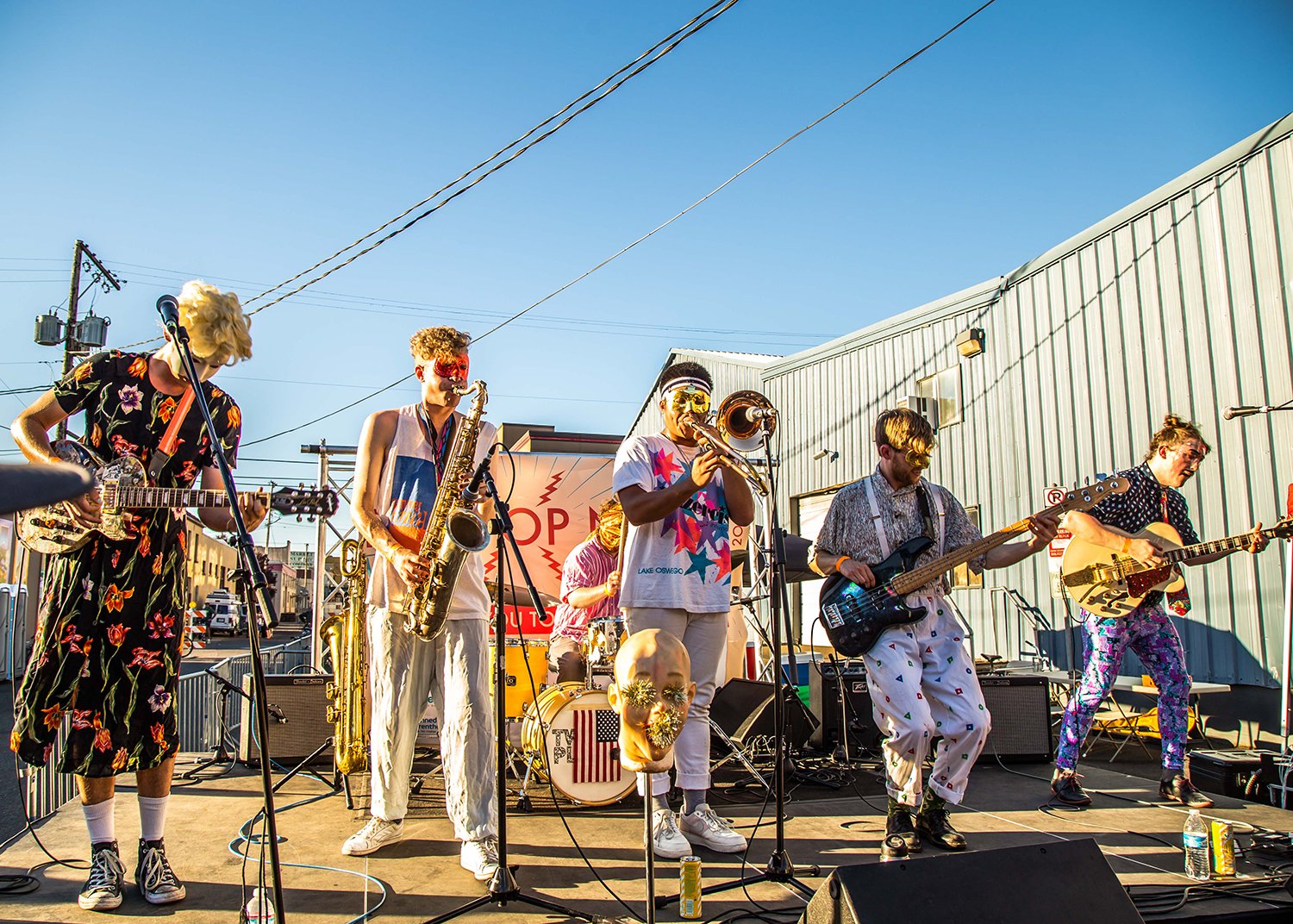Kulululu


It’s just before midnight and I’m riding my bike through Portland. It’s summer so it fees amazing and I’m flying down Rosa Parks Way. I arrive at a house that belongs to a human, but the human isn’t home. Instead I find a group of beings known as Kulululu. Adorned in strange garb and masks, they offer me a beverage and I begin to mingle. All the while they are plucking their instruments and having the most mirthful encounters. Our staff photographer Alexander Fattal arrives in hopes of photographing these mysteries beings. Beautiful chaos explodes during the “photoshoot.” One minute the beings are in perfect harmony, singing the original Mickey Mouse anthem, and the next they’re burping and laughing wildly. The laughter is contagious, and before I know it, I’m partaking in the gleeful merriment. The rumors I’ve heard are true. I and you and everyone is also the thing that they are called, which is Kulululu. Alex continues snapping photos and I grab the one other human I see, Kulululu’s sound engineer David Pollock, and we sit down to talk about recording these ethereal beings.
ELEVEN: You recorded Kulululu’s album. Can you tell me more about that process?
David Pollack: Yeah, I actually recorded it not too far from here, in my basement. It’s called Fortress Galaxy. It was so awesome, they came in many times over about two years.
11: So it took two years to make this record?
DP: Almost, but it was so quick. They would come in for half a day and just rock out four songs with guitar, drums, and bass live in my basement. It’s not a basement though, it’s a studio! It’s full of awesome shit!
11: Oh yeah? Like awesome gear? What’s some of your favorite gear?
DP: I don’t try to nerd out super hard on gear. I have a tape machine (reel-to-reel recording), and that is something a lot of people don’t have. I don’t do it as a process while recording; I do it as a way to add some flavor, later. Like if the drums need some color, I’ll record it on tape. I stay pretty minimal; in my own personal studio I only have eight inputs. I often go for like an old school ‘70s kind of sound, which means I’m using a lot of vintage ribbon microphones. It’s a quality over quantity deal. I have a handful of nice tools I can rely on.
11: Did they (Kulululu) come in with all pre written material, were they ready to go?
DP: Totally, they just slammed it out. They used my house kit (1972 Rogers kit), which is kind of like a Ludwig. It has a big, nice sound but they brought in their own cymbals. They had to sing really quietly though because I have a really small basement. We actually put the guitar amp in the bathroom. I just had to treat it like it wanted to be treated, it was really natural. I didn’t have to mix the shit out of it. The whole record was really easy to make. It was really quick. They would come in for a couple of days here and there and we’d throw down several songs. Then once we were done they gave it to me to mix. There was not a lot of going back and forth, which a lot of records usually are.
11: The majority of their songs are fairly short. Do you think that’s why it’s so easy?
DP: No, I don’t think that has any effect. I think they know what they want and they come in and play it like experts. They’re so talented. They are way better musicians than other people who play their kind of music. I think that’s a really interesting point. They just love this music and they are beyond what they are doing. They just slam it out and they do it for fun.
11: Yes I’ve definitely never seen anything quite like Kulululu.
DP: Recording the vocals, when we’re doing it live, some of them have to not sing because some of their vocals are so powerful the drum mic will pick it up! They all know each other so well. They’re so tight and so close to each other. I can’t stress enough how easy it is working with them. They will come in whenever there is free time.
11: It sounds like they have great work ethic!
DP: They do have great work ethic. They’re all high energy and really enthusiastic about it. Totally practiced and ready to go. They are a ball of fire that almost wears me out. Their sessions will be hours long and the enthusiasm never wanes.
11: That’s awesome, that’s how more people should be. How long have they been playing together?
DP: This group has been playing together for about three years, I believe.

11: So you guys are great at keeping pretty much everything about you ambiguous and secretive. Do you think that helps people focus on the music and stay in the moment when they’re at your shows?
DP: It’s easy for the crowd to get involved. It’s so over the top so they don’t take themselves as seriously. They don’t have their guard up. It invites them to shed their own identify in a way, if we’re being so silly we’re inviting them to follow along. We were at a show last week where the music was so silly and so weird that everyone in the crowd began dancing like they had never danced before. This showed exemplified exactly what we’re talking about. The band was also a costume band. A one-man costume band. Instead of people perceiving us as telling our stories, we’re non-people, non-members, and non-humans. We’re storytellers of some other reality. We’re not talking about our feelings or our stories.
11: I love that you’re imbuing people to let go and sort of disappear within the music. You have a goofy, silly vibe but what about the other side? What about serious sad music? Does that have no place in Kulululu?
Kulululu: I think there are songs that we play that once people listen to and hear the lyrics might think they are sad songs, even if they don’t sound sad. Like “Do What You’re Told” is kind of somber. It’s on a minor key. We get happy and fun in the middle but it’s definitely tapping into something.
DP: If you listen, they’re saying some heavy stuff–it’s not all fun and games. There’s more to it. There’s not a ton to it but I feel like your lyrics encapsulate an idea in a nicely packaged way, it’s a feeling. There’s always a feeling, there’s always something that you’re trying to say. Lyrically it’s NOT goofy, and I think that’s a misconception with the band. It’s deeper than it looks.
Kulululu: When lyrics are being written that sound heavier, it’s often describing weight that comes down on people. When you feel the weight of the world you can write about it and then release the weight. The idea is that through listening to that type of music that releases the weight of the world, the listener can feel the release of the weight as well. We think that’s where sad music and emotional music has a place.
11: With this album that you guys just put out, is there any kind of theme or concept you would associate with it?
Kulululu: Human life, every day. Things that people might not really talk about. The album is kind of like walking out the door and noticing what’s out there and then deciding to go back inside and close the door. Then put your shoes on and then you go and think about it a little bit. Then once you figure it out and once you know what it isn’t, that’s probably the most important part of what is going on with everything.
11: Any advice for young, aspiring musicians out there?
Kulululu: Yeah! Um, eat a lot of sugar and then play a lot of music after you’ve eaten a lot of sugar. That’s how I play all my music. And do it younger when you can eat a lot of sugar and not feel really bad. I also think I had a breakthrough when I put strings on my guitar. It started to work better. And then you tune it and you get a pick. Another thing I like, when you take the tuning you’re supposed to use and you don’t use that.
11: Can you speak about the creative process at all?
Kulululu: The way that most of the music is originally conceptualized is me in my basement with all the instruments. I create a demo with all the instruments the way that I sort of envision it. Then the band will sort of inhale or chow down or take a munch or a bite out of the sandwich of sound and once they taste the sandwich they are sort of able to digest it in a way that results in this really great turd.
11: So you’re the squatty potty for the band?
Kulululu: Well, maybe? We also just want to give a personal shout out to all music educators (and educators in general). I think at some point in time all of us were involved in some sort of music program and the schools in Kulululu land are really, really good. Those people helped with the creative processes.
11: Any last messages for our readers?
Kulululu: Not only do we need to appreciate our musical educators, we need to appreciate our musicians. If musicians got compensated for the time they spend sending emails, the time they spend rehearsing, the time they spend packing and unpacking gear, the time they spend sound-checking and doing promotional work to make sure a show is a success, being a musician would be a living wage job. But it’s not, because people think it’s all fun and games. Not to mention the greed that has poisoned business owners and administrators. People in charge of our music scene have no problem asking performers to pay money out of the door to cover the cost of a sound person, a door person, a stage manager, etc. It’s despicable. That money is the only money the performers have any access to unless they’re able to afford to produce and sell merch. These institutions call themselves music venues and expect the musicians to pay for the necessary amenities of a music venue. The economics are all wrong. And it’s the artists who are suffering. People will argue that the businesses will fail if they don’t take a cut from the door. I say they should fail then because they’re not offering an environment that is appealing to the public. We HAVE to step up and support the artists in our community so that we can foster and maintain a vibrant culture of creatives that can afford to make and share the purest of art. »
Catch Kulululu live in Portland this month September 22 at Bunk Bar



